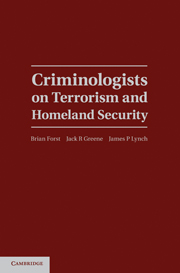18 - Criminal Justice and Terrorism
Published online by Cambridge University Press: 04 February 2011
Summary
INTRODUCTION
Criminologist Richard Rosenfeld observed – just a year after the 9/11 attack – that a sea change had occurred in politics since the attack, but very little had changed in the field of criminology. His case was compelling: Though terrorism differs from crime in one fundamental way – it involves violence for an ideological cause rather than for personal gain – criminologists should study it nonetheless because it shares many other elements with crime, and criminologists may be able to apply their frameworks for analysis fruitfully to terrorism. He added that studying terrorism might even make criminology richer.
The contributors to this anthology have demonstrated that we accept Rosenfeld's argument, and we are not alone. Terrorism courses have emerged in criminal justice and criminology programs throughout much of the academy, and criminologists are engaging increasingly in research on terrorism. Much in the manner that a political scientist (James Q. Wilson), an industrial engineer (Alfred Blumstein), and an economist (Gary Becker) expanded the way we think about crime and analyzed it in the late 1960s, forty years later criminologists from different disciplines and with different skill sets are taking up Rosenfeld's challenge, and thinking about terrorism in ways that are usefully informed by our understanding of violence and its basic elements. We have learned that terrorism is indeed different from crime in important ways, but that it shares essential features that cannot be ignored either by those aiming to enrich our field, or by those wishing to contribute to the public policy debate about how to prevent and respond to the problem.
- Type
- Chapter
- Information
- Criminologists on Terrorism and Homeland Security , pp. 443 - 460Publisher: Cambridge University PressPrint publication year: 2011
References
- 1
- Cited by

